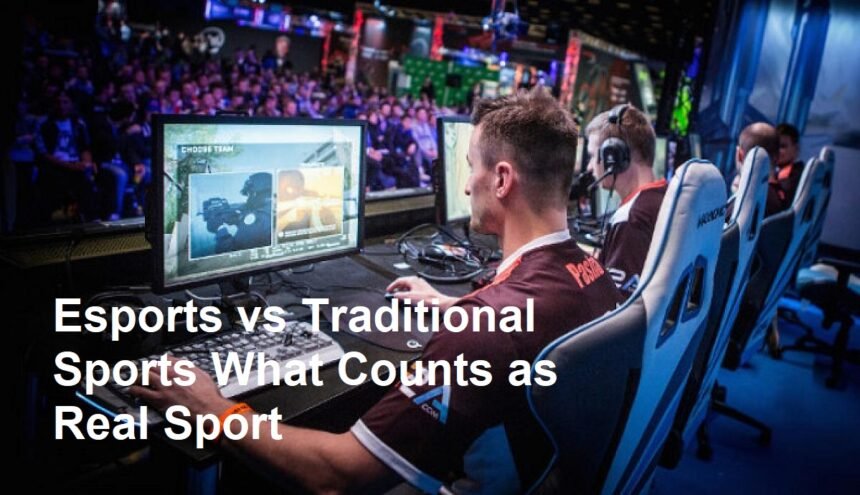Introduction
The debate around esports vs traditional sports has become hotter than ever. Some people argue that nothing can replace the sweat, discipline, and teamwork of football, basketball, or tennis. Others believe esports deserves the same respect since it requires skill, strategy, and millions of fans now treat it like any other competitive sports event.
But the big question remains: What actually counts as a “real” sport? Let’s explore both sides, look into gaming and health impacts, and see where digital sports trends are heading.
What Defines a Sport?
Before we compare, it helps to ask: What makes something a sport? Generally, a sport includes:
- Competition
- Skill and training
- Rules or structure
- Entertainment value
By this definition, both esports and traditional sports fit. But the physical activity factor is what often sparks debate.
Esports: The Rise of Digital Competition
The Growth of Esports
Esports has grown into a billion-dollar industry with international tournaments, celebrity players, and sponsorships from global brands. Games like League of Legends, Counter-Strike, and Dota 2 fill stadiums with fans just like the Super Bowl or the World Cup.
Skills Involved in Esports
Contrary to stereotypes, professional gamers aren’t just “playing for fun.” They train for hours daily, mastering:
- Hand-eye coordination
- Reflexes and reaction speed
- Strategic thinking
- Team communication
Just like traditional athletes, esports players face intense pressure and competition.
Gaming and Health: The Concerns
Of course, one major criticism lies in gaming and health. Long screen time can lead to:
- Eye strain
- Poor posture
- Sedentary lifestyle risks
But modern esports training now includes fitness routines, mental coaching, and even diet management to help players stay healthy.
Traditional Sports: The Timeless Classics
Why Traditional Sports Still Dominate
Traditional sports like soccer, basketball, or athletics carry a long cultural history. They showcase physical endurance, teamwork, and often become community bonding activities.
Health Benefits of Traditional Sports
Playing traditional sports is linked with:
- Stronger heart and muscles
- Better mental health through physical activity
- Social bonding and teamwork
This is where traditional sports clearly win in the fitness department.
Esports vs Traditional Sports: Key Comparisons
Physical vs Mental Demands
- Traditional sports focus heavily on physical endurance, strength, and agility.
- Esports highlight mental agility, fast reflexes, and focus.
Audience and Entertainment
Both esports and traditional sports attract millions of live viewers and even bigger online audiences. In fact, esports tournaments on Twitch or YouTube sometimes surpass traditional events in viewership numbers.
Professional Career Paths
- Traditional athletes usually have shorter careers due to physical strain.
- Esports players may retire young due to burnout but can continue as streamers, coaches, or content creators.
Digital Sports Trends: Blurring the Lines
The future of digital sports trends shows both worlds merging. Some examples include:
- Virtual reality (VR) fitness games combining physical activity with gaming.
- Augmented reality (AR) sports where digital layers enhance real competitions.
- Hybrid tournaments where esports events are held in traditional sports stadiums.
This blending suggests that the definition of “sport” is evolving.
Tips for Choosing Between Esports and Traditional Sports
If you’re wondering where to invest your time or your kids’ energy, here are some practical tips:
1. Consider Balance
- If you enjoy gaming, make sure to also include some physical activity.
- If you’re into sports, don’t underestimate the strategic and fun aspects of gaming.
2. Look at Long-Term Health
- Esports players should stretch, exercise, and manage screen time.
- Traditional athletes should watch out for injuries and burnout.
3. Follow Your Passion
At the end of the day, whether esports or traditional sports, the best choice is the one you’re passionate about. Passion leads to discipline, which leads to success.
Conclusion:
What Counts as Real Sport?
So, in the debate of esports vs traditional sports, the truth is both deserve recognition. One tests your body, the other your mind—but both bring competition, community, and excitement.
As digital sports trends grow, the line between physical and digital will blur even further. Instead of arguing, maybe it’s time to celebrate the diversity of sports in all forms.
Do you think esports should be considered a “real sport”? Or do you believe only traditional games deserve that title? Share your thoughts in the comments below — I’d love to hear your perspective!











